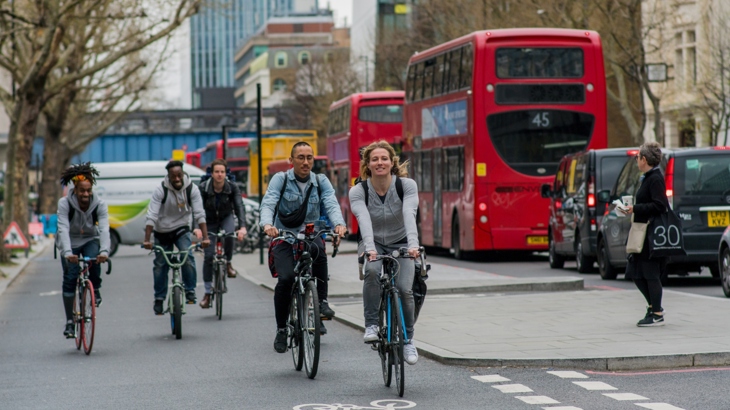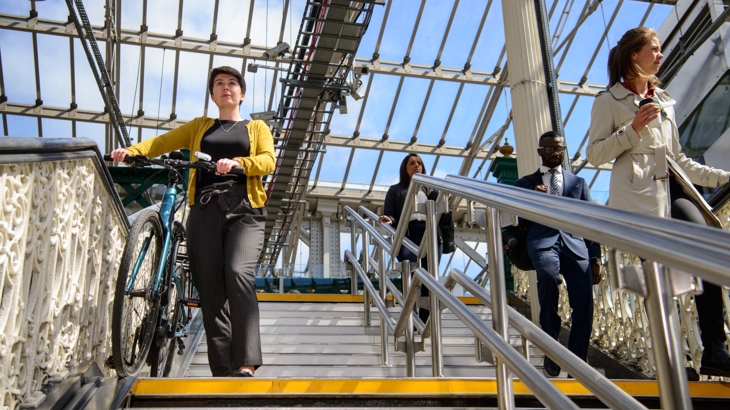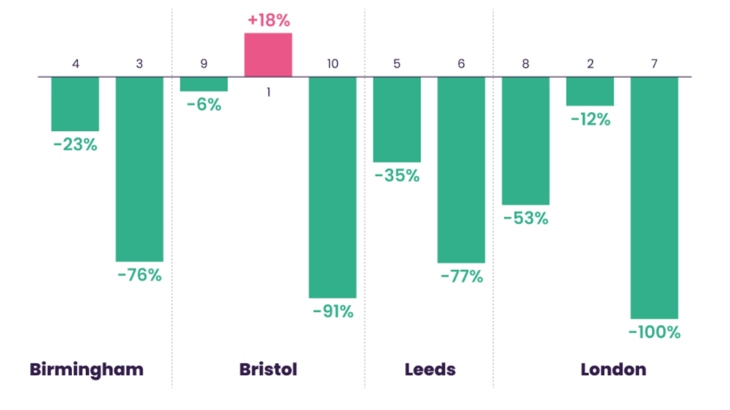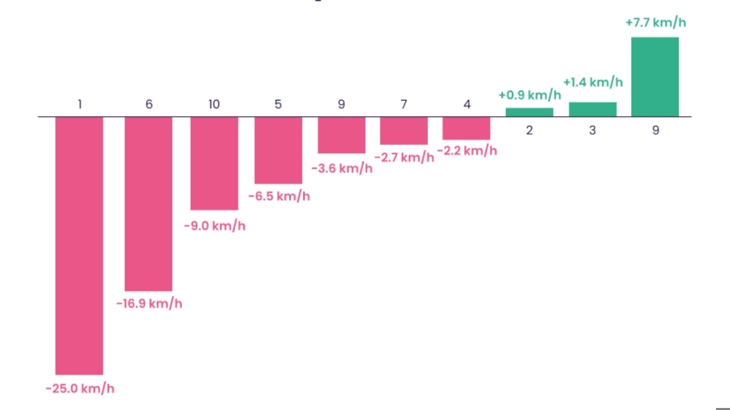Giving up or reducing car travel is the first step for many to walking, wheeling and cycling more of their everyday journeys. In early 2022, our friends at the climate action charity Possible undertook a revealing piece of research called Going Car Free. In recognition of Car Free Day, we asked Possible’s Car Free London Campaigner, Carolyn Axtell to write a guest blog for Sustrans, sharing some of the results of the study.

Possible asked 10 participants across Birmingham, Bristol, Leeds and London to keep travel diaries for four weeks. Photo: J Bewley/photojB
The Going Car Free study followed ten people as they hung up the keys to their cars for three weeks and promised to not significantly change their everyday commitments.
We wanted to find out what the participants would need to live a car-free lifestyle, and identify the personal and structural barriers they’d encounter in making this change.
About Possible's study
Ten participants were recruited to the study through social and print media across Birmingham, Bristol, Leeds and London.
The final group was chosen to ensure a range of experiences and backgrounds were represented, encompassing age, gender, childcare and caring responsibilities, ethnicity and disability.
The study ran for four weeks between 10 January to 6 February 2022.
To record a baseline, participants logged their travel habits for one week, whilst continuing to have full access to their private vehicles.
For the remaining three weeks, participants again logged their journeys and transport choices, but this time they were challenged to do without their cars and instead travel in more sustainable ways.
To remove private car travel as an option, one participant even gave their car keys to a family member for the duration of the challenge.
Initial apprehension about reducing car use
Before the challenge, the ten participants gave multiple reasons for using private cars and vans, including:
- habit
- self-reliance
- instant availability
- not having to plan trips in advance
- space for baby naps and feeding
- private space to wait during school pick-up
- ability to catch up with family members
- freedom from having to think about what to wear.
On the other hand, participants also gave a number of reasons for disliking their cars and vans, including:
- congestion
- cost
- feeling unsafe around other drivers
- obligation to drive for other people’s benefit.
Exploring the health benefits of going car free
When asked about the impact of car use on health and wellbeing, the participants noted both lack of exercise and stress.
Although protection from bad weather, and the idea of the car as a refuge, were positives which people wondered how they’d manage without.
In reflecting on going car free, the benefits participants experienced included:
- calming change of pace
- less rushing around
- more time outside
- fresh air.
A mother in the study reported that not using the car to ferry children around, had freed up 20 minutes of the day for herself.
She also valued knowing that her children were socialising with peers and developing their independence and confidence by walking to school together.
Cars perceived as cheap and safe
Participants were generally aware that owning vehicles is expensive and were keen to cut this expense, but acknowledged that car costs are unclear as they’re normally absorbed into regular outgoings.
This led to some commenting that cars have low day-to-day costs, and that using a car feels free on a day-to-day basis, especially when travelling within a city and for short distances.
The car was reported to feel safe, but this came with an acknowledgement that death and serious injuries are regularly reported in the local media.
Feelings of car safety increased after dark and when transporting children, with keeping children protected and women safe given as motivations for continued car use.
Walking attractive and cycling enjoyable
The participants found that walking was attractive as it was free, felt good and was a good habit.
Conversely, they had issues with the time taken to get places, air pollution concerns, and noted the poor quality of walking infrastructure.
The participants felt cycling was enjoyable, less affected by traffic and less stressful than public transport.
On the other hand, participants often felt unsafe, particularly when there wasn’t a good cycling infrastructure.
Cycling also forced compromise, such as not being able to give children a lift to school when cycling to work.
In addition to reflecting on walking and cycling, participants also recorded their experiences of e-scooters, buses, trains, car clubs and taxis.

Participants showed that for many people, low-carbon travel isn’t necessarily more expensive or prohibitively slower than driving a private car. Credit: John Linton/Sustrans
Carbon and financial savings from going car free
Almost all Going Car Free participants reduced their carbon emissions per km travelled.
The total CO2 emissions saving for weeks two, three and four (the car free period) was 372kg, which is around the same as three return flights for one passenger from London to Berlin.
Before allowing for distance travelled, every participant except one* made emissions savings between week one (car use) and weeks two, three and four (no car use).
*This participant made a number of longer train and taxi journeys than they did in week one.
Three participants across Bristol, Leeds and London managed individual transport carbon emission-free weeks.
When considering distance travelled combined with carbon emissions (gCO2/km), all but one* improved their carbon travel efficiency.
*This participant in Bristol used car club cars which were deemed to be higher in emissions than their private car.
Moreover, almost all participants made financial savings by going car free.
Only two participants who used car clubs and e-scooters spent more money going car free.
Almost all Going Car Free participants reduced their carbon emissions per km travelled

Credit: Possible
Distance, time and speed of low-carbon journeys varies
Participants responded to the challenge of living car free in different ways.
Some dramatically reduced the distance they travelled, while others saw a small increase.
Most spent more time on their car free travel, but a few spent dramatically less.
Both factors can be taken into account by calculating how their average speed of travel changed.
Participants Two, Four and Ten in London, Birmingham and Bristol had faster average speeds, whilst Participants One and Nine in Bristol were significantly slower.
Most, but not all, participants travelled more slowly

Credit: Possible
Huge shift to cycling and public transport
Kilometres travelled by car dropped 87% (from 160km to 21km) during the car-free weeks, and all other transport modes increased.
Public transport and bicycles were used the most, with weekly kilometres covered by train, tram and bus increasing by 29km for the average participant, and 26km for bicycles.
The average participant’s car travel dropped from 380 minutes to just 30 minutes each week.
Over the course of the study period:
- cycling rose from six minutes to 165 minutes
- public transport from six minutes to 121 minutes
- walking from 131 to 164 minutes.
Participants made lifestyle changes after going car free
After the challenge, most participants were not ready to sell their car, but all reported using their cars less or using alternative modes for some journeys.
- Participant Two in London sold their car and replaced it with an e-bike.
- Participants Three in Birmingham and Participant Six in Leeds decided to go from being two-car households to one-car households.
- Participant Four in Birmingham was planning to buy another car to become a two-car household, but the trial made them reconsider.
- Participant Seven in London is looking to buy an e-cargo bike.
- Participant Eight in London and Participant Ten in Bristol are both hoping to buy new bikes to continue to cycle.
Possible’s conclusions
- The participants showed that for many people, low-carbon travel isn’t necessarily more expensive or prohibitively slower than driving a private car.
- All participants reported that undertaking the challenge in winter months had made them realise that they don't need cars to protect them from cold or wet weather, warm waterproofs were enough. And if they could travel more sustainably in winter, then they could do it all year-round.
- Some participants are selling their cars, demonstrating that living car free is more feasible and enjoyable than people may think.
- Generally, all participants thought reducing car use was the right thing to do, but they believed the transition to sustainable transport would come with compromise.
- All participants reported using their cars less or using alternative modes for some journeys, so the study has demonstrated how a short-term intervention to reorganise routines, can create long-term behaviour change.
- This suggests that developing people’s confidence in their ability to change how they travel, may require them to experience the potential benefits of that change first.
Public awareness needs to be raised on how comparatively expensive car ownership is, alongside the societal and environmental costs of private car ownership.
Likewise, the benefits of making everyday journeys by more sustainable means, such as walking, wheeling and cycling, need to be amplified.
Importantly, people must be supported and enabled to experience these many benefits first-hand.
Governments must urgently shift to subsidising sustainable transport modes to meet our climate goals if going car free is to become a reality for most of us.
Our thanks to Carolyn Axtell, Car Free London Campaigner at Possible.
Read the full briefing document of this study.





